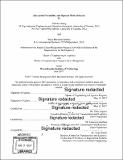Intermodal variability and optimal mode selection
Author(s)
Huang, Tianshu, M. Eng. Massachusetts Institute of Technology; Serrano, María Bernarda
DownloadFull printable version (7.683Mb)
Other Contributors
Massachusetts Institute of Technology. Supply Chain Management Program.
Advisor
Chris Caplice and Francisco Jauffred.
Terms of use
Metadata
Show full item recordAbstract
Transportation cost is one of the major costs in supply chain. Companies need to optimize every aspect of the transportation process to reduce the total logistics cost. A key aspect is optimal mode selection to minimize the cost of every lane in a company's transportation network. The traditional approach is to select the mode based on freight cost and average transit time. Besides these two factors, the transit variability associated with each mode choice also impacts the transportation cost in an indirect way. In particular, higher variability of transit time will lead to a higher safety stock level in order to keep up with service level, resulting in higher inventory holding cost. To study the impact of transit time variability, we first generated transit time distribution from data provided by a larger retailer. Then we constructed a total logistics cost equation based on transportation cost, inventory cost that incorporates both average transit time and transit time variability from the transit time distribution. Lastly, we conducted sensitivity analysis using the total logistics cost equation with respect to changes in service level, load value, and volume. Beside mode selection problem, our approach of including cost of variability in total cost calculation can be applied to general problems that deals with uncertainties.
Description
Thesis: M. Eng. in Logistics, Massachusetts Institute of Technology, Supply Chain Management Program, 2017. Thesis: M. Eng. in Supply Chain Management, Massachusetts Institute of Technology, Supply Chain Management Program, 2017. Cataloged from PDF version of thesis. Includes bibliographical references (pages 48-49).
Date issued
2017Department
Massachusetts Institute of Technology. Supply Chain Management ProgramPublisher
Massachusetts Institute of Technology
Keywords
Supply Chain Management Program.